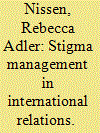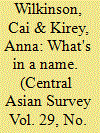| Srl | Item |
| 1 |
ID:
131488


|
|
|
|
|
| Publication |
2014.
|
| Summary/Abstract |
This article develops a theoretical approach to stigma in international relations and resituates conventional approaches to the study of norms and international order. Correcting the general understanding that common values and norms are the building blocks of social order, this article claims that international society is in part constructed through the stigmatization of "transgressive" and norm-violating states and their ways of coping with stigma. Drawing on Erving Goffman, this article shows that states are not passive objects of socialization, but active agents. Stigmatized states cope strategically with their stigma and may, in some cases, challenge and even transform a dominant moral discourse. A typology of stigma management strategies is presented: stigma recognition (illustrated by Germany); stigma rejection (illustrated by Austria); and finally counter-stigmatization (illustrated by Cuba). Because of the lack of agreement on what constitutes normal state behavior, attempts to impose stigma may even have the opposite effect-the stigmatizers become the transgressive. A focus on stigma opens up new avenues for research on norms, identities, and international order.
|
|
|
|
|
|
|
|
|
|
|
|
|
|
|
|
| 2 |
ID:
101299


|
|
|
|
|
| Publication |
2010.
|
| Summary/Abstract |
In this article, we focus on the ways in which non-heterosexual and transgender youth involved with the non-governmental organization 'Labrys' in Kyrgyzstan have begun to demand the protection of their basic civil and human rights on the basis of self-identification as 'LGBT'. This acronym, which stands for Lesbian, Gay, Bisexual and Transgender, is relatively new to Kyrgyzstan and other post-Soviet states, and represents a change in the terms used by non-heterosexual and transgender people to describe themselves. We frame our discussion using the concepts of sexual citizenship, private/public divides and stigma and base our discussion on debates amongst the staff and community of Labrys about the purpose and scope of the organization. Centrally, we suggest that the strategic use of 'LGBT' as a public and politicized identity represents a new, pro-active form of stigma management. By employing this strategy, young LGBT people become 'would-be' sexual citizens and challenge traditional societal norms that seek to keep discussion of sex and sexuality in the private sphere and restrict rights to heterosexual, cisgender citizens.
|
|
|
|
|
|
|
|
|
|
|
|
|
|
|
|